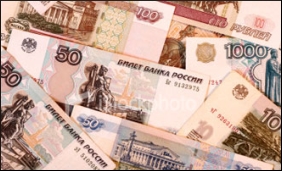|

|
Russia accepts one-year anti-economic crisis plan
|
|

|
|
| Top Stories |
 |
|
|
|
IANS | 28 Jan, 2015
Russian authorities have approved a one-year anti-economic crisis plan, which requires no additional spending from the federal budget, Finance Minister Anton Siluanov said Tuesday.
"Yesterday, the government held a meeting with the country’s leadership, which adopted an anti-crisis plan," TASS news agency quoted the finance minister as saying.
"This plan stipulates no increase in budget spending. Moreover, we expect the volume of expenditures to become less than planned," he said.
The anti-crisis plan stipulates that the government should pursue adequate budget policy to reach a deficit-free budget by 2017 if the oil price go up to USD 70 per barrel, the finance minister said.
The government also has the task to avoid spending sovereign reserves thoughtlessly, Siluanov said.
"All the resources, which will be allocated to implement this plan, will be found in the anti-crisis reserve set aside in the budget whose volume equalled 193 billion rubles (USD 2.8 billion) at the start of the year," he said.
"Now that some decisions have been made on the use of these funds, this volume equals about 170 billion rubles," Siluanov said.
The Russian government will also find resources inside existing state programmes and propose measures to re-distribute resources to concentrate them in the most important and necessary areas, he said.
The anti-crisis plan stipulates that the government should pursue adequate budget policy to reach a deficit-free budget by 2017 if the oil price go up to USD 70 per barrel, the finance minister said.
The government also has the task to avoid spending sovereign reserves thoughtlessly, Siluanov said.
"The plan is intended for about one year and stipulates the preparation of new structural reforms so that we can have a new quality of state governance, a new quality of the budget and can keep our reserves instead of spending them in a year or two," he said.
Russian Prime Minister Dmitry Medvedev submitted the anti-crisis plan to President Vladimir Putin Monday.
The Russian president who approved the plan said its implementation should ensure social stability.
"This can be done only if acceptable parameters are kept in the economy, primarily relating to the budget, inflation, the level of foreign debt, the preservation of reserves and so on," Putin said.
"These are what we were rightly proud of in recent years and what is called macroeconomic stability," he said.
The Russian president also urged the government to think of budget spending optimisation.
According to the draft document that was finalised before it was submitted to the Russian president Monday, the anti-crisis plan should be implemented in three key areas: spurring economic growth, providing support to individual industries and ensuring social stability.
Previous reports said a total of 1.375 trillion rubles would be required to implement measures mapped out by the government.
Russian Deputy Prime Minister Arkady Dvorkovich said at the Davos Economic Forum last week that the government’s anti-crisis plan stipulated support for systemically important companies in industry, the energy sector, agriculture, transport, communications and other sectors.
According to a Xinhua news agency, Standard & Poor's downgraded late Monday Russia's credit rating from BBB- to BB+, citing "Russia's less flexible monetary policy and possible further deterioration of the country's economy".
The S&P decision would not affect the Russian capital market as the agency was unaware the austerity measures had been approved by the government, Siluanov said.
|
|
|
| |
|
|
|
|
|
|
|
|
|
|
|
|
|
|
| |
| Customs Exchange Rates |
| Currency |
Import |
Export |
US Dollar
|
66.20
|
64.50 |
UK Pound
|
87.50
|
84.65 |
Euro
|
78.25
|
75.65 |
| Japanese
Yen |
58.85 |
56.85 |
| As on 13 Aug, 2022 |
|
|
| Daily Poll |
 |
 |
| PM Modi's recent US visit to redefine India-US bilateral relations |
|
|
|
|
|
| Commented Stories |
 |
|
|
|
|
|
| |
|